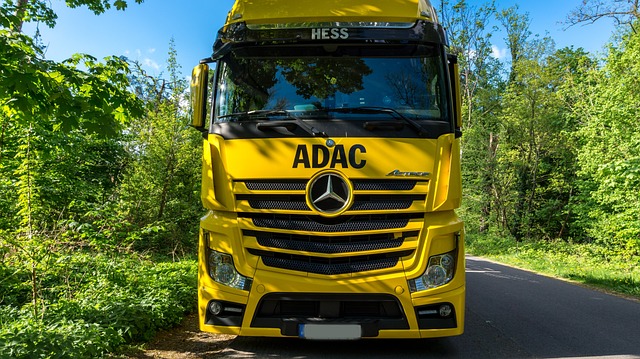Insuring a box truck fleet requires careful consideration of various insurance components to protect against the specific risks associated with trucking, such as cargo damage, traffic accidents, and liability claims. A comprehensive insurance policy tailored to your fleet's operations is essential for financial security and business stability. Key elements include liability coverage to meet legal obligations, physical damage protection to safeguard the trucks themselves, cargo insurance to protect valuable goods, and uninsured/underinsured motorist coverage. It's important to evaluate insurance providers with expertise in commercial trucking, considering factors like driver experience and safety records that influence premiums. Strategic risk management, including regular vehicle maintenance, adherence to safety standards, and driver training programs, can lead to lower insurance costs. Regular reassessment of your fleet's insurance needs, leveraging the strengths of specialized insurers, and understanding the interplay between deductibles and coverage are crucial for maintaining an efficient and secure box truck operation within the trucking industry.
Navigating the complexities of insurance for box trucks is a critical task for fleet operators in the trucking industry. As the demand for cargo transport via box trucks continues to rise, ensuring robust coverage becomes paramount. This article delves into the essentials of securing comprehensive insurance for box truck fleets, evaluating various coverage options, and understanding how driver profiles influence rates. Furthermore, it outlines effective strategies to manage risks and contain costs, empowering fleet owners with the knowledge necessary to safeguard their operations against unforeseen events. Understanding these aspects is not just about compliance; it’s a strategic move for the sustained success of your box truck enterprise.
- Understanding the Necessity of Comprehensive Insurance for Box Truck Fleets
- Evaluating Coverage Options for Box Truck Fleet Operators
- The Impact of Drivers on Insurance Rates and Policies for Box Trucks
- Strategies for Mitigating Risks and Minimizing Costs in Box Truck Fleet Insurance
Understanding the Necessity of Comprehensive Insurance for Box Truck Fleets

Operating a fleet of box trucks within the trucking industry necessitates a robust insurance policy tailored to the unique challenges these vehicles face. As box trucks traverse various routes, they are subject to risks such as cargo damage, accidents, and liability issues, which can lead to costly repairs, medical expenses, or legal disputes. A comprehensive insurance package for these fleets ensures financial protection against such eventualities, safeguarding the business’s assets and operations from unforeseen circumstances.
Fleet owners must consider the multifaceted nature of trucking insurance, which typically includes coverage options for liability, physical damage, cargo, and uninsured/underinsured motorists. Liability insurance is critical as it addresses legal responsibilities to other drivers or property owners. Physical damage coverage protects the trucks themselves from theft, vandalism, or collisions. Cargo insurance safeguards the valuable goods being transported, while coverage for uninsured or underinsured motorists offers additional security against hit-and-run incidents or drivers with inadequate policies. Understanding these components and tailoring a policy to fit the specific needs of the box truck fleet is essential for risk management and long-term financial stability within the trucking sector.
Evaluating Coverage Options for Box Truck Fleet Operators

For box truck fleet operators, evaluating coverage options is a multifaceted task that requires a comprehensive understanding of the risks associated with the trucking industry. It’s crucial to assess the specific needs of your operations, including the types of cargo transported and the routes traveled. Comprehensive insurance packages for box trucks often include liability coverage, which addresses the legal implications if your truck is involved in an accident causing damage or injury to third parties. Additionally, physical damage protection safeguards your investment against collisions, theft, or vandalism. Operators must also consider the value of cargo and whether it requires additional insurance to ensure full coverage during transit.
When sifting through potential insurance providers for your box truck fleet, look for carriers that specialize in commercial trucking insurance. These insurers are well-versed in the nuances of the industry and can tailor policies to fit your unique operational requirements. Catered options may encompass everything from basic liability coverage to more complex needs such as on-hook towing, general liability for non-truck related business activities, and employee workers’ compensation. It’s advisable to compare quotes and coverages from multiple insurers to find the most robust and cost-effective insurance plan for your box truck fleet. This due diligence not only protects your assets but also offers peace of mind, allowing you to focus on optimizing your trucking operations.
The Impact of Drivers on Insurance Rates and Policies for Box Trucks

When evaluating insurance rates for box trucks within a fleet, the driving records and profiles of each operator are critical factors that underwriters scrutinize. A fleet with drivers boasting clean records and ample experience can secure more favorable rates compared to those with a history of traffic violations or accidents. This is because experienced drivers present a lower risk, which insurance companies are keen to assess through comprehensive driver background checks. In the realm of trucking, where safety and reliability are paramount, insurers tailor their policies to account for these variables, often incorporating telematics or usage-based insurance options that monitor driving behavior, providing real-time data to adjust premiums accordingly. Fleets with drivers who exhibit safe driving habits may benefit from lower rates due to this data-driven approach, which underscores the importance of driver selection and ongoing training in managing insurance costs for box truck operations.
Strategies for Mitigating Risks and Minimizing Costs in Box Truck Fleet Insurance

When managing a box truck fleet, it’s imperative to implement robust strategies that mitigate risks and minimize insurance costs. A comprehensive risk management plan is essential for fleet operations, encompassing regular vehicle maintenance to prevent accidents and ensure compliance with safety regulations. By investing in reliable trucks and conducting routine checks, you can significantly reduce the likelihood of costly repairs and downtime caused by unexpected mechanical failures. Additionally, driver training programs focused on defensive driving techniques not only improve road safety but also lower the potential for insurance claims related to operator errors.
In terms of insurance coverage, understanding the nuances of commercial trucking insurance policies is key. Tailoring your fleet’s insurance portfolio with a combination of liability, cargo, and physical damage coverages can provide a financial safeguard against various eventualities. Carriers often offer customizable options that align with the specific risks associated with box truck operations. For instance, opting for higher deductibles can result in lower premiums, yet it’s crucial to balance this with the financial reserves your business can afford to cover in case of a claim. Moreover, bundling policies or choosing insurers that specialize in trucking can yield cost-effective solutions, reflecting their expertise and market position. Regularly reviewing these insurance needs, especially as your fleet grows or operational requirements change, is vital to maintain optimal coverage and cost efficiency.
When operating a box truck fleet within the competitive trucking industry, securing robust insurance coverage is pivotal for safeguarding your assets and ensuring business continuity. This article has delved into the essential aspects of obtaining comprehensive insurance, from evaluating various coverage options to understanding how drivers influence rates and policies. By implementing strategic risk mitigation techniques and exploring cost-effective insurance solutions, fleet operators can navigate the complexities of this sector with confidence. It’s clear that investing in professional insurance tailored for box truck fleets is not just a legal necessity but a critical component for any trucking business aiming for longevity and success.
